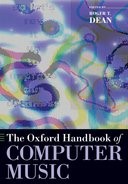 The Oxford Handbook of Computer Music
The Oxford Handbook of Computer Music
Contents
-
-
-
-
-
-
-
-
-
-
-
-
-
-
-
-
-
-
-
1. Electronic Dance Music and Its Abstractions 1. Electronic Dance Music and Its Abstractions
-
2. Musicians' Relationship with Technology 2. Musicians' Relationship with Technology
-
A. Sampling and Copyright A. Sampling and Copyright
-
B. Glitch (Only Mistakes Are Original) and Microsound (Lost in Close-up) B. Glitch (Only Mistakes Are Original) and Microsound (Lost in Close-up)
-
-
3. From Sound Art to Digital Art 3. From Sound Art to Digital Art
-
4. Overload 4. Overload
-
5. Live Electronica 5. Live Electronica
-
6. Conclusion 6. Conclusion
-
Notes Notes
-
Bibliography Bibliography
-
-
-
-
-
-
-
-
-
-
-
17 Electronica
Get accessNick Collins is a composer, performer and researcher who lectures at the University of Sussex. His research interests include machine listening, interactive and generative music, and musical creativity. He co-edited the Cambridge Companion to Electronic Music (Cambridge University Press 2007) and The SuperCollider Book (MIT Press, 2011) and wrote the Introduction to Computer Music (Wiley 2009). Sometimes, he writes in the third person about himself, but is trying to give it up. Further details, including publications, music, code and more, are available from http://www.sussex.ac.uk/Users/nc81/index.html
-
Published:18 September 2012
Cite
Abstract
Electronica is a term that appeared in the later 1990s as a descriptor for divergent electronic dance musics (EDMs) and their abstractions. This article aims to engage not only with digital culture in general but also with its necessarily analog roots and the continued existence of hybrid signal chains. Its remit is to concentrate on the age from the founding of the musical instrument digital interface standard (1983), and this coincides with the proliferation of digital equipment, the rise of EDM, and then its multiply fractured and fast breeding offshoots. There are also parallel adventures in digital art, noise music, video jockeying (VJing), live electronics, and a host of other movements touching on the electric and the programmable. Much of the technology itself is available to all, however, and many electronic musics have crossed over into mass appeal, from EDM to the more abstract electronica freely employed in technology commercials.
Sign in
Personal account
- Sign in with email/username & password
- Get email alerts
- Save searches
- Purchase content
- Activate your purchase/trial code
- Add your ORCID iD
Purchase
Our books are available by subscription or purchase to libraries and institutions.
Purchasing information| Month: | Total Views: |
|---|---|
| October 2022 | 5 |
| November 2022 | 2 |
| December 2022 | 10 |
| January 2023 | 4 |
| March 2023 | 2 |
| June 2023 | 2 |
| August 2023 | 1 |
| December 2023 | 2 |
| January 2024 | 4 |
| March 2024 | 2 |
| June 2024 | 2 |
| July 2024 | 4 |
| October 2024 | 4 |
| November 2024 | 1 |
| December 2024 | 3 |
| January 2025 | 8 |
| February 2025 | 3 |
| April 2025 | 1 |
Get help with access
Institutional access
Access to content on Oxford Academic is often provided through institutional subscriptions and purchases. If you are a member of an institution with an active account, you may be able to access content in one of the following ways:
IP based access
Typically, access is provided across an institutional network to a range of IP addresses. This authentication occurs automatically, and it is not possible to sign out of an IP authenticated account.
Sign in through your institution
Choose this option to get remote access when outside your institution. Shibboleth/Open Athens technology is used to provide single sign-on between your institution’s website and Oxford Academic.
If your institution is not listed or you cannot sign in to your institution’s website, please contact your librarian or administrator.
Sign in with a library card
Enter your library card number to sign in. If you cannot sign in, please contact your librarian.
Society Members
Society member access to a journal is achieved in one of the following ways:
Sign in through society site
Many societies offer single sign-on between the society website and Oxford Academic. If you see ‘Sign in through society site’ in the sign in pane within a journal:
If you do not have a society account or have forgotten your username or password, please contact your society.
Sign in using a personal account
Some societies use Oxford Academic personal accounts to provide access to their members. See below.
Personal account
A personal account can be used to get email alerts, save searches, purchase content, and activate subscriptions.
Some societies use Oxford Academic personal accounts to provide access to their members.
Viewing your signed in accounts
Click the account icon in the top right to:
Signed in but can't access content
Oxford Academic is home to a wide variety of products. The institutional subscription may not cover the content that you are trying to access. If you believe you should have access to that content, please contact your librarian.
Institutional account management
For librarians and administrators, your personal account also provides access to institutional account management. Here you will find options to view and activate subscriptions, manage institutional settings and access options, access usage statistics, and more.